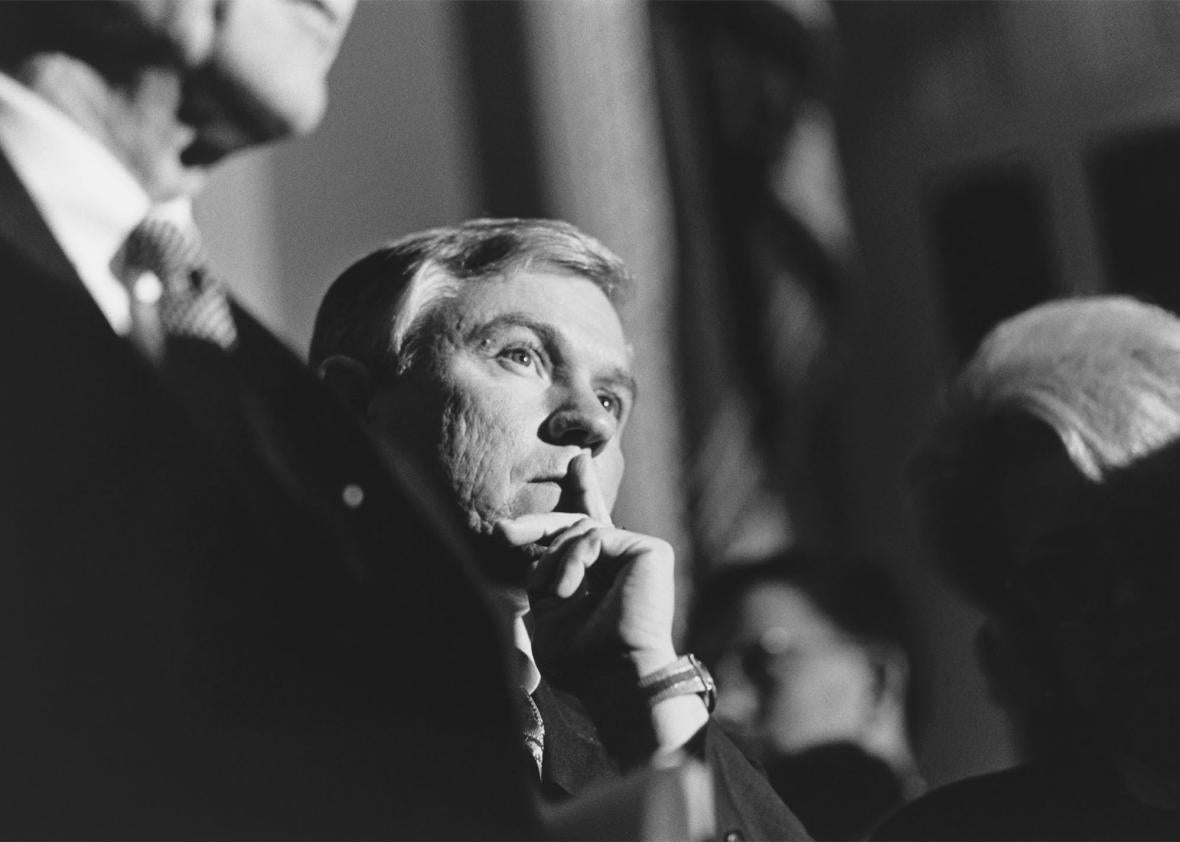Last week, Attorney General Jeff Sessions delivered a speech at Georgetown University Law Center in which he argued that “freedom of thought and speech on the American campus are under attack.” As my colleague Dahlia Lithwick explained, the attorney general said this in “a room full of prescreened students who asked him prescreened questions while political demonstrators outside were penned off in ‘free speech zones.’ ” Ensconced in a safe space of his own, Sessions blasted the notion that speech can be “hurtful,” criticizing administrators and students for their “crackdown” on “speech they may have disagreed with.”
Sessions’ hypocrisy on speech issues is not a new development. In 1996, the then–attorney general of Alabama used the full power of his office to try to shut down an LGBTQ conference at the University of Alabama. Sessions took his battle to court, asking a federal judge to let him block the conference altogether—or, at the very least, silence students who wished to discuss LGBTQ issues. He ultimately failed, but his campaign reveals a great deal about his highly selective view of free expression. Sessions claims to support freedom for “offensive” speech, but when speech offends him, he is all too happy to play the censor.
When Sessions served as Alabama attorney general, the state still criminalized sodomy. A 1992 law, Alabama Education Code Section 16-1-28, also barred public universities from funding, recognizing, or supporting any group “that fosters or promotes a lifestyle or actions prohibited by” the sodomy statute, either “directly or indirectly.” The law also forbade schools from allowing such organizations to use public facilities. Sessions’ predecessor, Jimmy Evans, had interpreted the statute to effectively outlaw the discussion or promotion of gay rights on public campuses, with that prohibition even extending to AIDS awareness campaigns.
In 1995, the University of South Alabama’s Gay Lesbian Bisexual Alliance sued in federal court to block Section 16-1-28. That summer, the U.S. Supreme Court had ruled that, under the First Amendment, public universities may not deny access to facilities or funding for student organizations on the basis of their viewpoints. This decision, the GLBA asserted, rendered Section 16-1-28 unconstitutional. U.S. District Judge Myron H. Thompson agreed, holding the law to be invalid in a January 1996 ruling.
This decision was excellent news for the Gay Lesbian Bisexual Alliance at the University of Alabama at Tuscaloosa. The GLBA had planned to host the Fifth Annual Lesbian, Gay, and Bisexual College Conference of the Southeastern United States in February 1996. Sessions, by now attorney general, was trying his hardest to shut it down.
“University officials say they’re going to try to obey the law,” Sessions said at the time, as CNN’s Andrew Kaczynski reported in December of last year. “I don’t see how it can be done without canceling this conference. I remain hopeful that if the administration does not act, the board of trustees will.” Sessions didn’t give up even after Judge Thompson struck down the law. “I intend to do everything I can to stop that conference,” he said.
In a last-ditch effort, Sessions returned to Thompson’s court and asked permission to ban the conference. “The State of Alabama,” he explained in court filings, “will experience irreparable harm by funding a conference and activities in violation of state law.” Failing a total ban, Sessions implored Thompson to let him censor any discussion of “safe sex and the prevention of sexually transmitted diseases.” Sessions claimed that, by talking about LGBTQ issues, conference attendees were essentially conspiring to promote criminal activity, and Alabama should not be obligated to support their criminality. Predictably, Thompson rejected Sessions’ arguments, writing that the attorney general was endeavoring to violate students’ free speech rights. Sessions then appealed to the 11th U.S. Circuit Court of Appeals, which unanimously ruled against Alabama. The conference went on as planned.
Cathy Lopez Wessell, a lead organizer and spokeswoman for the conference, told me Sessions’ intervention “was incredibly stressful. We got threatening phone calls. We were attacked from all sides.” She continued, “We were the abomination of the month. I didn’t feel safe in the world for a while. I started to internalize some of the judgment leveled at our group. I thought, there must be something deeply wrong with you if you need to be silenced.”
Lopez Wessell explained that Sessions’ campaign against the conference registered as a broader attack on LGBTQ students.
“If we can’t talk, do we have a right to exist?” Lopez Wessell asked. “If our speech is so dangerous that it needs to be stopped, then are we dangerous? We weren’t promoting any particular activity; we just wanted to talk—about our experiences, about our existence.”
I asked Lopez Wessell what she made of Sessions’ new free speech crusade.
“How can he grandstand about freedom of speech when he has a history of suppressing the free speech of groups that he doesn’t agree with?” Lopez Wessell said. “He actively worked to repress our First Amendment rights to free speech and free assembly because we wanted to talk about gay and lesbian issues. He praises free speech now, but he aggressively used his office to suppress this conference.”
In his address last week, Sessions declared that “the right to freely examine the moral and the immoral” is “indispensable for a healthy republic,” urging universities to “defend free expression boldly and unequivocally.” As U.S. attorney general, Sessions has certainly defended some expression—the right of students to proselytize on campus, for instance, or the right of bakers to refuse to serve same-sex couples. But when LGBTQ students wished to speak on campus 21 years ago, he did everything he could to silence them. Sessions purports to defend “the free, robust, and sometimes contentious exchange of ideas.” What he really supports are ideas he agrees with.
